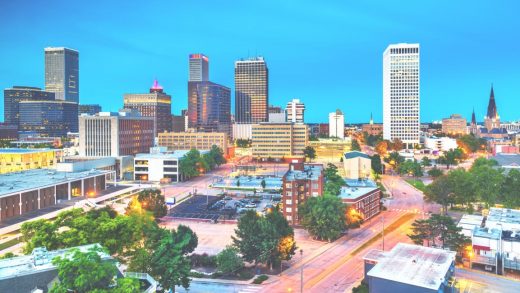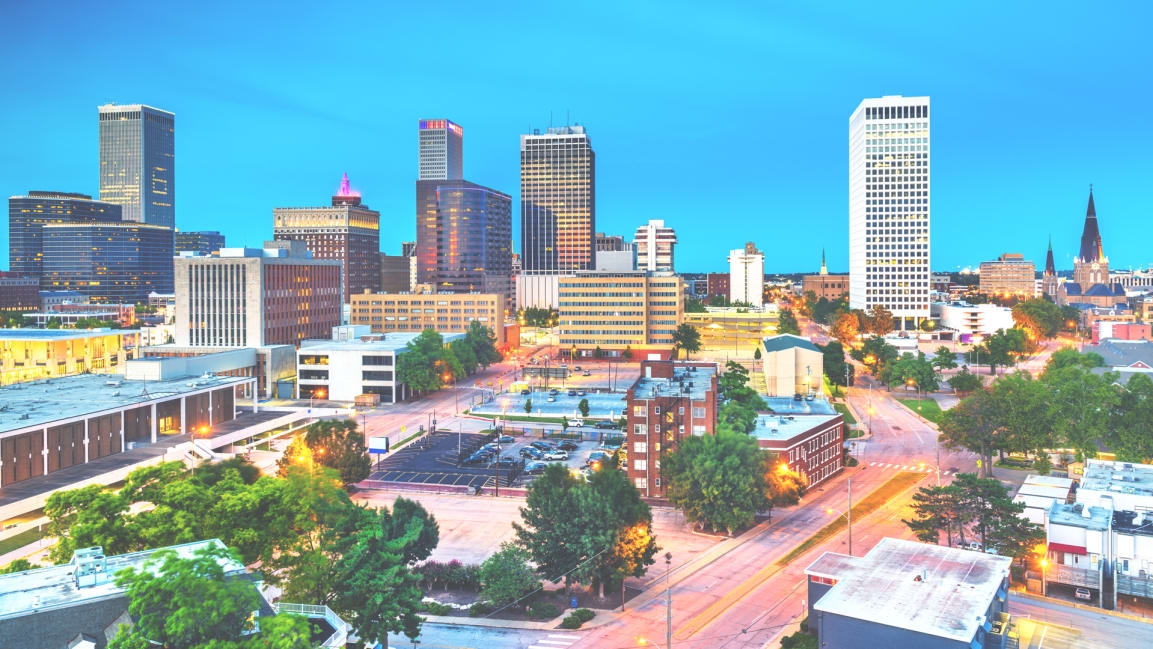Tulsa paid people $10k to move there and work remotely. Here’s how it worked out
Bee Law has called many corners of the United States home. Born in Rochester, and raised and educated in North Carolina, she’s also lived in Atlanta, Washington D.C., San Francisco, Oakland, and Los Angeles. So when the 29-year-old entrepreneur was deciding where to launch her video-based social network for anime and geek fandom, QuirkChat, she had a lot of options to consider.
“After the pandemic I knew I wasn’t going to go back to California, so I was in limbo looking for that next place to call a home base,” she says.
Last year, while researching the Tulsa Massacre, Law came across an ad for a program called Tulsa Remote, which enticed remote workers and entrepreneurs to the mid-sized Oklahoman city with a $10,000 relocation stipend. In exchange, successful applicants are required to call the city home for at least 12 months. “It was intriguing to see how Black entrepreneurs were building back up Tulsa, as a Black entrepreneur and founder myself,” says Law, who was invited to be one of 842 members of Tulsa Remote’s 2021 cohort.

[Photo: courtesy of QuirkChat]
Beyond the relocation stipend, the program also provides successful applicants with one year of free co-working space, workshops, networking events, and a range of other resources. “With Tulsa Remote you get a built-in community, instead of coming here on my own, which was kind of intimidating,” says Law.
Since its founding in 2018, Tulsa Remote has brought nearly 1,300 remote workers to town, and a new study suggests that the investment is paying off. According to a report published by the Economic Innovation Group (EIG), for every dollar spent on the relocation incentive, $13.77 was generated in local labor income. The study also found that for every two household members brought to Tulsa through the program, one new local job was created. All told, Tulsa Remote is estimated to have contributed $62 million in new labor income to the local economy in 2021.
“Remote workers tend to be well paid; they’re in white collar digital and professional occupations, generally speaking, and those tend to come with pretty high salaries,” explains Kenan Fikri, EIG’s research director. According to the study, the average annual income of program members is nearly $105,000. “A lot of that money stays in the local economy.”
The Right Program For the Right City
Tulsa is not the only city that offers remote workers cash in exchange for taking up residence, but researchers warn not every city stands to enjoy the same economic benefits in return.
“There does seem to be a sweet-spot nature, not just to the size of the Tulsa metro, but other characteristics in terms of their domestic migration pattern, [and] in terms of their lagging in a certain segment of their workforce,” says EIG ‘s president and CEO, John Lettieri. “This was a program that was right-sized and designed to fill a lot of those gaps, and then scaled in such a way as to have a significant impact on an economy of the size of the Tulsa metro.”
Lettieri explains that prior to Tulsa Remote, the city had a negative net migration of about 1,200 per year, and the majority of people leaving were college-educated. It is no coincidence that the program has sought to attract roughly the same number of new residents. As a result, Lettieri says Tulsa hasn’t suffered from many of the negative consequences associated with a rush of new, well-paid residents, such as a spike in housing prices and rising cost of living.
Digital Nomads Are Looking for a Place to Call Home
Part of the reason why the program has proven so successful is that remote workers in big cities often struggle to find a sense of community. The researchers explain that much of the value of the program comes from ongoing contributions to the local economy, after the one-year requirement has expired. While the monetary incentive helps put Tulsa on the map for remote workers, they believe the program has been successful in keeping them in town by providing a level of support they wouldn’t enjoy elsewhere.
“We shouldn’t underestimate how important the pure signaling alone is; that’s certainly a big part of it,” says Lettieri. “If you take the relative anonymity of living in a city like New York or San Francisco, and contrast that with the Tulsa Remote experiment—of a place rolling out the red carpet for you and saying in monetary, and more importantly, non monetary ways, how much they value you—people feel good about that,” adds Fikri.
While monetary incentives help bring people to town, Lettieri and Fikri believe that other local amenities and support structures ultimately inspire them to stay, allowing the program to generate lasting value.
“I don’t think people are going to make a permanent life decision, or even a medium term one, based on a relatively small financial incentive,” says Lettieri. “This is an important part of the local economic development strategy, and the fact that it was designed and backed by a key local institution, in partnership with other local stakeholders, is a big part of the battle.”
Not A One-Size-Fits All Solution
Lettieri and Fikri emphasize that the wrong takeaway from the experiment is that any city can enjoy the same economic benefits by offering cash incentives to remote workers. They believe that Tulsa Remote’s selection process, which intentionally seeks out talent that is needed but otherwise lacking in the city, is what ultimately drives its success.
“Each community is unique, and has to have a unique set of data that they’re monitoring and working through regularly,” says Ben Stewart, the senior program officer at the George Kaiser Family Foundation, which designed and funded the Tulsa Remote program. “This is not a one-size-fits-all solution.”
Since the program’s launch, and especially since the start of the pandemic, Stewart says he’s fielded calls from every corner of the country, and beyond, with inquiries related to replicating the program elsewhere. “Not a week goes by without hearing from one city that’s thinking of this, everyone from Alaska to Hawaii to Georgia to New York State,” he says.
Stewart says he encourages each city to consider their unique economic and labor force needs, what they can offer remote workers in exchange for filling those gaps, and what programs, projects, or initiatives would encourage them to stay beyond the initial term. He adds Tulsa Remote’s success is partially owed to the appeal of the city itself, which he describes as a “hidden gem,” as well as other redevelopment efforts that have been undertaken in recent years.
“As we considered why Tulsa has been successful, I think it’s a lot of the place-making attributes that the foundation and the city have been focussed on over the last decade or so,” he says. “This major public-private partnership to develop the city’s waterfront, the fact that there’s a burgeoning art scene, I think Tulsa was positioned well, not just because of its size, but because of the assets and amenities that are here that people just didn’t know about previously.”
Remote For America
In creating Tulsa Remote, Stewart says he was inspired by Teach for America, a non-profit organization that deploys graduates from the country’s top universities to low income communities to teach for two years.
“We saw more and more of those members stay beyond their two years of service,” he says. “It inspired us to think of other ways to bring people into the equation, and remote work was an interesting venue.”
The program, explains Stewart, furthers the George Kaiser Family Foundation’s mandate of reversing the cycle of generational poverty in the local community.
When Tulsa Remote first launched in the fall of 2018, Stewart says organizers were anticipating 15 to 20 applicants. Instead they received more than 10,000 in the first 90 days. In 2020, as more Americas were given the opportunity to work remotely in the wake of the pandemic, that number jumped to 50,000.
“We’re most proud of the fact that we’ve retained more than 90%,” says Stewart. “Over 90% stay beyond the year.”
Since moving to Tulsa this past June, Law has herself hired four locals, and has no intention of leaving once her term is up in the summer of 2022. “We’re going to stay here for sure,” she says. “Tulsa has been really great, and we do plan to buy a house next year.”
Fast Company , Read Full Story
(37)



